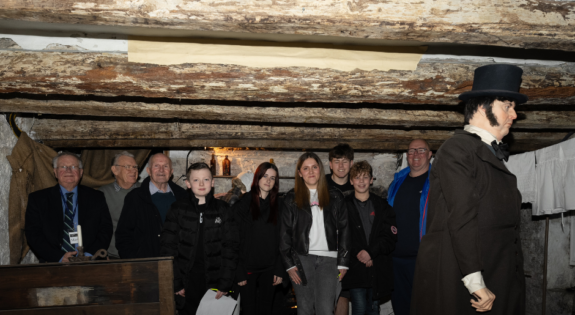News
August 19th 2024
A journey through history: Army Cadets visit the Octavia Hill Museum in Wisbech
Cadets from 3 Coy were the first cadet units from Lincolnshire Army Cadet Force to visit the Octavia Hill Museum in Wisbech offers a unique and enriching experience that ties their modern-day service to the legacy of a pioneering social reformer.
This visit not only provided an historical context but also highlights Octavia Hill’s significant contributions to the Army Cadet Force and other organisations, highlighting her enduring influence on social welfare and public service.
Octavia Hill’s Impact on the Army Cadet Force
Octavia Hill (1838-1912) was a visionary social reformer whose work extended into various facets of society, including the establishment and promotion of the Army Cadet Force. Hill recognised the potential of structured military training to provide young people, particularly those from underprivileged backgrounds, with discipline, a sense of duty, and opportunities for personal development. Her advocacy played a crucial role in the early support and promotion of the Army Cadet Force, emphasising the importance of instilling values such as leadership, responsibility, and community service in youths of the time. These values are still championed in today’s Army Cadets forces around the country, especially in Lincolnshire.
Contributions to Other Organisations
Hill’s influence was not limited to the Army Cadet Force. She was deeply involved in several organisations aimed at improving social welfare. Notably, she was a key figure in the Charity Organisation Society, where she championed personal service and individualised attention in social work. Her approach was hands-on, she personally visited the poor, ensuring aid was administered with dignity and respect.
Additionally, Hill co-founded the National Trust, an organisation dedicated to preserving and protecting historic places and green spaces for public enjoyment. Her vision was to provide urban populations with access to nature, fostering a sense of well-being and community. This organisation continues to play a vital role in conservation efforts across the UK.
The Museum Experience
The Octavia Hill Museum in Wisbech provides an immersive experience into the life and achievements of this remarkable woman. The museum, located in her birthplace, is filled with artifacts, photographs, a collection of Army Cadet memorabilia and documents that narrate Hill’s journey and impact. Key exhibits include:
- Personal Artifacts: Items from Hill’s daily life that give visitors a tangible connection to her personal history.
- Historical Documents: Letters and records that highlight her advocacy and organizational work.
- Photographs and Portraits: Visual representations of Hill and the environments she worked to improve.
- Interactive Displays: Engaging exhibits that illustrate her contributions to social reform and conservation.
Educational Benefits for Army Cadets
For the Army Cadets, the visit to the Octavia Hill Museum is not just a historical outing but an educational experience that reinforces their training and values. The museum offers:
- Historical Context: Understanding the origins and evolution of the Army Cadet Force and its connection to broader social reform movements.
- Inspiration: Learning about Hill’s dedication to service can inspire cadets to embrace their roles with renewed commitment and pride.
- Leadership Lessons: Insights into Hill’s leadership style and her ability to mobilise resources and people for the greater good.
A Lasting Impression
The visit to the Octavia Hill Museum will undoubtedly leave a lasting impression on the cadets. By connecting their modern-day service to Hill’s legacy, they gained a deeper appreciation for the values of discipline, duty, and community service. This experience is a powerful reminder of the impact one individual can have on society and the enduring importance of their contributions.
Conclusion
Taking the Army Cadets to the Octavia Hill Museum in Wisbech was an invaluable opportunity to connect history with contemporary service. It highlights the significant contributions of Octavia Hill to the Army Cadet Force and other organisations, providing cadets with historical context, inspiration, and leadership lessons. This visit not only enriched their understanding of social welfare and public service but also reinforces the values that underpin their training and development.
3 Company of Lincolnshire Army Cadet Force would like to thank the staff at the museum for their incredible hospitality and warm welcome, which contributed to another successful cadet experience, put together by Lincs ACF.



